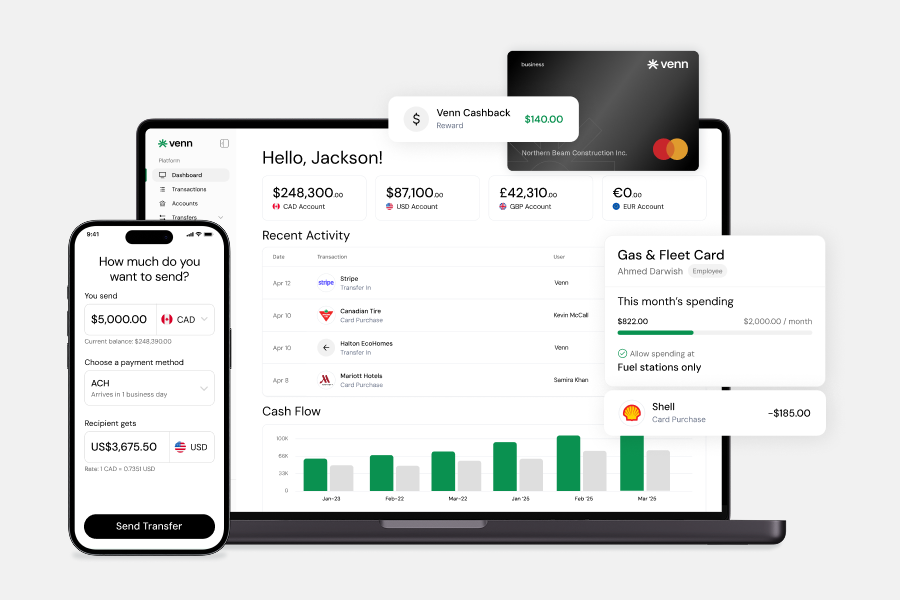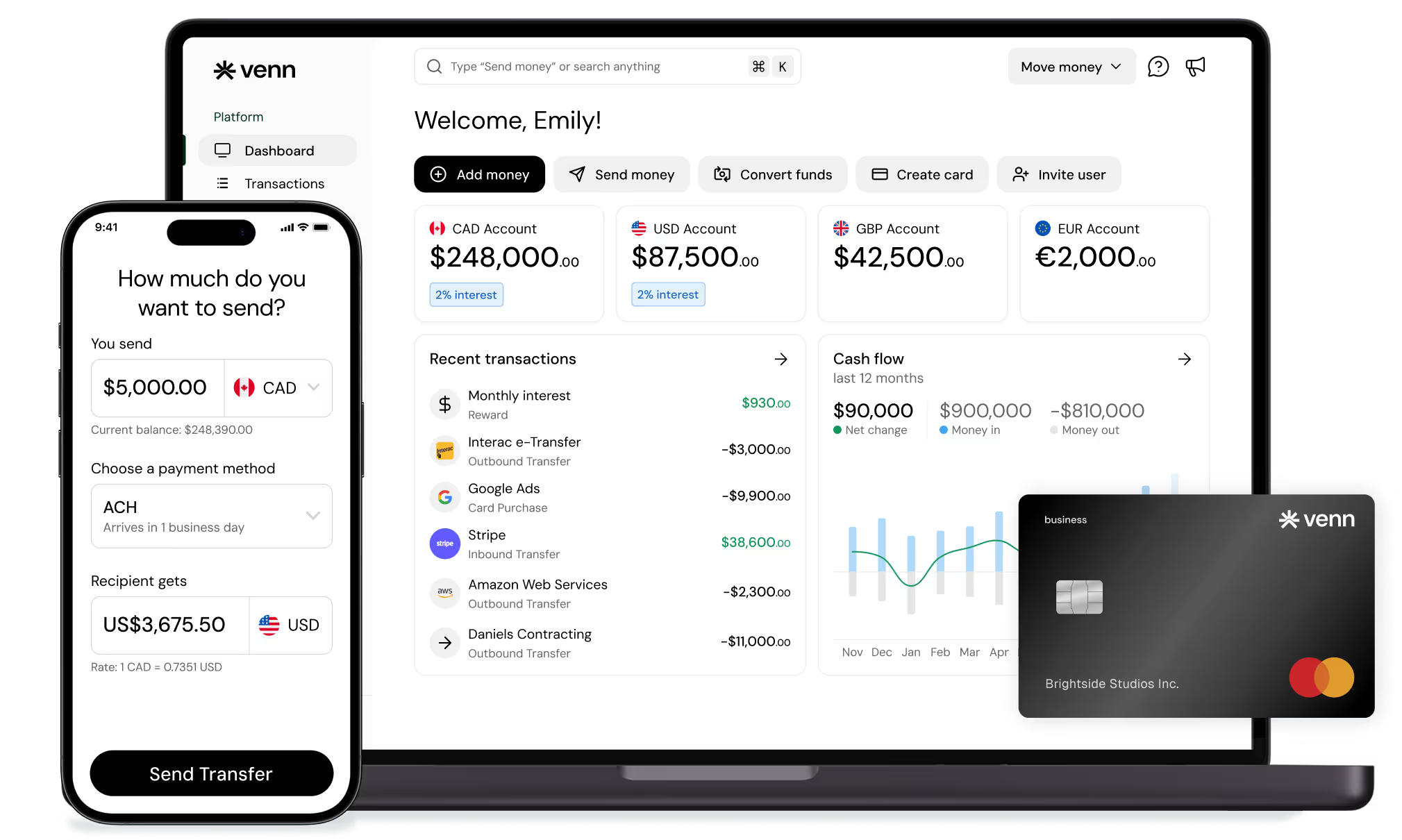GAAP (Generally Accepted Accounting Principles) for Small Businesses: Why You Need to Know
Learn what GAAP principles are, why they matter, and how they guide accurate financial reporting for businesses in Canada. Stay compliant and audit-ready.


Trusted by 5,000+ Canadian businesses
Business banking for Canada
Local CAD and USD accounts, corporate cards with cashback, the lowest FX rates in Canada, free local transfers, and more.
GAAP, or Generally Accepted Accounting Principles, began in the United States as a framework created to keep financial reporting consistent across industries.
The Financial Accounting Standards Board (FASB) oversees GAAP, and the Securities and Exchange Commission (SEC) requires all public companies in the U.S. to follow it. This ensures that reports are reliable and comparable for investors and regulators.
In Canada, things work a bit differently. Private companies usually follow Accounting Standards for Private Enterprises (ASPE), while public companies follow International Financial Reporting Standards (IFRS).
But no matter the framework, the purpose is the same: GAAP helps business owners present financial statements that are accurate, comparable, and audit‑ready.
This article explores why GAAP matters for small businesses, its 10 core principles, the benefits and challenges, and how modern tools like Venn help streamline compliance.
Why GAAP Matters to Small Businesses
Many small business owners assume GAAP only applies to large public companies. And while it's true that public corporations are the ones required to follow these standards, understanding the basics is considered best practice even for small businesses.
Here’s why:
- Standardization: GAAP standardizes financial statements, which assures compliance with financial laws and simplifies tax filings.
- Transparency: By requiring accurate and consistent reporting, GAAP prevents manipulation and builds credibility with lenders or investors.
- Decision-making: Reliable data influences management decisions on everything from budgeting to scaling operations.
In short, GAAP guides financial reporting, validates reporting accuracy, and supports transparency for investors.
Now, some business owners also wonder, “Do I need an accountant to stay compliant with GAAP?” While software can automate many processes, an accountant can help interpret complex rules and prevent costly errors, especially during audits or funding rounds.
Core GAAP Principles Explained
The foundation of GAAP rests on 10 principles that enforce uniformity in financial reporting and define standard accounting practices that every business can trust.
Principle of Regularity
Accountants must strictly adhere to all GAAP rules in the accounting process. No shortcuts or deviations. For example, a retail shop that consistently updates inventory using the FIFO method (First-In, First-Out) ensures compliance and audit readiness.
Principle of Consistency
Once an accounting method is chosen, it should remain consistent unless formally changed and disclosed. To illustrate, a manufacturing firm that uses straight-line depreciation across years can reliably compare historical financial data.
Principle of Sincerity
Financials must be reported truthfully and without bias, building trust with stakeholders.
Principle of Permanence of Methods
Accounting methods must be consistently applied across all financial reporting periods. For instance, a transportation business that applies the same depreciation method yearly provides comparability and supports forecasting.
Principle of Non-Compensation
Businesses cannot offset liabilities against assets or expenses against revenue without disclosure. This prevents misleading results and limits creative accounting.
Principle of Prudence
This principle requires caution when making estimates and judgments. It governs expense allocation and prevents overstating assets or income. More importantly, it keeps financial reporting grounded in reality rather than overly optimistic assumptions.
Principle of Continuity
Assumes businesses will continue to operate indefinitely. Assets are valued at historical cost rather than liquidation value, ensuring stability.
Principle of Periodicity
Financial reports should cover specific intervals, such as quarterly or annual statements. This structures revenue recognition and helps assess performance over time.
Principle of Materiality
Only significant financial details must be disclosed. For example, a $50 office supply purchase may be omitted, but a $50,000 loan default must be reported. This principle mandates full disclosure of material items.
Principle of Utmost Good Faith
This principle requires that all individuals involved in the financial reporting process act honestly and in good faith. It supports the overall integrity of accounting practices.
How Do GAAP Principles Impact Financial Statements?
GAAP directly shapes the three core financial statements:
- Balance Sheet: GAAP regulates balance sheet presentation, ensuring assets and liabilities are properly classified.
- Income Statement: It impacts income recognition by requiring accrual‑based accounting, giving a truer view of profitability.
- Cash Flow Statement: GAAP ensures that cash inflows and outflows are reported consistently, giving business owners and stakeholders a clear view of liquidity and the company’s ability to meet short-term obligations.
These standards improve credibility. For example, including clear payment terms examples in financial notes ensures consistency and helps financial institutions evaluate reliability.
Relationship between GAAP and IFRS
While GAAP and IFRS share the same goal, they differ in approach.
GAAP was developed in the United States and is rules-based, meaning it provides very specific guidance for almost every accounting scenario. IFRS, on the other hand, was created to be used internationally and is principles-based, offering more flexibility in interpretation.
In Canada, public companies are required to use IFRS, while private enterprises typically follow ASPE, which is adapted from GAAP but designed to be more practical for small businesses.
For companies operating internationally, understanding both systems is critical. For example, a Canadian startup expanding into the U.S. may prepare reports under ASPE at home but needs GAAP-compliant statements for U.S. investors.
Convergence efforts between GAAP and IFRS aim to eliminate this type of duplication, thereby making financial reporting more comparable across borders.
Small businesses should also stay mindful of which standard applies to their operations. Unlike minor bookkeeping issues such as transposition errors, choosing the wrong reporting framework can cause serious compliance risks.
Advantages of Using GAAP for Small Businesses
Understanding GAAP provides small businesses with more than just tidy books. From easier access to financing to smoother tax filings, these advantages help set you up for long-term success:
- Improved clarity: GAAP standardizes financial statements for easier analysis.
- Access to financing: Lenders and financial institutions trust GAAP‑compliant reports.
- Tax compliance: Aligns with regulations, lowering audit risk.
- Comparability: Allows year‑over‑year and peer benchmarking.
- Credibility: Strengthens trust with stakeholders.
- Growth readiness: Positions businesses for IPOs or acquisitions.
Common Challenges in Implementing GAAP Principles for Small Businesses
While GAAP offers numerous benefits, implementing it isn’t always straightforward. Here are some of the most common challenges:
- Understanding complex, rules‑heavy standards.
- Limited staff and resources to manage compliance.
- Difficulty finding affordable accountants familiar with GAAP.
- Frequent updates to standards that require ongoing training.
- Establishing internal controls to prevent fraud.
To ease the burden, many companies adopt accounting automation tools that minimize errors, streamline processes, and make compliance easier.
How to Ensure GAAP Compliance in Your Organization
GAAP compliance doesn’t happen by accident. It requires consistent effort and the right systems in place.
Here’s how to start:
- Adopt accounting systems like QuickBooks, Xero, or NetSuite that standardize reports.
- Train staff to understand GAAP’s impact on daily operations.
- Schedule regular audits to verify the accuracy of reporting.
- Work with professionals when complex adjustments or transitions are required.
Simplify Your Accounting and FX Transfers with Venn
GAAP compliance becomes easier when your financial operations are streamlined. Venn helps Canadian businesses simplify their operations by centralizing multi-currency accounts, payments, and reporting on a single platform.
With Venn, you can:
- Manage CAD, USD, GBP, and EUR accounts in one place: Receive payments locally without cross-border fees that add up over time.
- Automate FX transfers at transparent rates: Save on conversions compared to traditional providers while always knowing your cost upfront.
- Reconcile payments seamlessly with QuickBooks and Xero: GAAP-aligned reporting is easier when every transaction syncs automatically into your books.
- Equip teams with one corporate card for all currencies: No need to issue a separate card per currency, and every purchase earns unlimited 1% cashback.
- Send payments faster: Most transfers settle on the same or next business day, compared to the 3–5 day delays many competitors impose.
✔ For startup CFOs, this means clean audit trails to present to investors.
✔ For SMB finance managers, it reduces the burden of manual reconciliations and tax compliance.
✔ For agencies and global teams, it means paying contractors and vendors across borders without hidden fees or delays.
Stay organized, audit-ready, and compliant. All in one platform with Venn.
Key Takeaways
- GAAP provides structure and consistency in financial reporting, helping small businesses build credibility and prepare for audits or financing.
- While GAAP can feel complex, applying its core principles reduces errors, supports transparency, and limits risk in financial reporting.
- Tools like Venn simplify multi-currency payments, reconciliations, and reporting, making it easier to stay organized and audit-ready.
Frequently Asked Questions (FAQs)
Q: Is it Necessary to hire a Professional to ensure GAAP Compliance?
While not always strictly mandatory, hiring a professional accountant or bookkeeper is highly recommended to ensure GAAP compliance. These professionals possess the expertise to interpret complex accounting standards, validate your financial records, and implement proper internal controls. This is particularly crucial during audits or when preparing statements for investors and lenders, as professional guidance significantly reduces the risk of costly errors and non-compliance issues.
Q: What are the Costs Involved in Adopting GAAP for a Business?
The costs associated with adopting GAAP typically include the price of robust accounting software (such as QuickBooks or Xero), ongoing professional fees for accountants/bookkeepers, internal staff training, and the potential expense of periodic audits. While there may be a higher initial investment, businesses find that GAAP-aligned reporting delivers substantial long-term value by ensuring consistency, reducing audit risk, and greatly improving access to external financing.
Q: What Software Helps With GAAP Compliance?
Several accounting software platforms facilitate GAAP compliance, including industry leaders like QuickBooks Online, Xero, Sage Intacct, and NetSuite. Platforms like Venn enhance this process by integrating directly with QuickBooks and Xero. This integration allows financial transactions to synchronize automatically and in real time, drastically reducing the manual work required for reconciliation and maintenance of GAAP-compliant records.
Q: Can You Switch To GAAP Principles for Your Financial Reporting?
Yes. Businesses have the option to transition their financial reporting to GAAP principles, even if they were previously using a simpler method like cash-basis accounting. However, making this transition requires restating certain prior-period financial data and implementing new internal accounting policies. Due to the complexity of these adjustments, professional guidance from a qualified accountant is strongly advised to ensure the switch is smooth, complete, and fully compliant with all relevant standards.
Venn is all-in-one business banking built for Canada
From free local CAD/USD accounts and team cards to the cheapest FX and global payments—Venn gives Canadian businesses everything they need to move money smarter. Join 5,000+ businesses today.

Frequently asked questions
Everything you need to know about the product and billing.
Venn is the cheapest and easiest way to manage your business banking needs. We offer the best currency exchange rates in Canada, chequing accounts in multiple currencies, domestic and international bank transfers, and a corporate Mastercard to manage all your spend. By signing up to Venn you automatically get:
- Accounts in Canadian dollars, US dollars, British pounds, and Euros
- The cheapest FX rates in Canada with free domestic transfers (EFT, ACH, SEPA, FPS)
- A Mastercard Corporate card that gets you the same great FX rates and cashback with no minimum spend requirements
Yes, Venn holds eligible deposits at our Partner Institution in our trust accounts, including deposits in foreign currencies. CDIC protects eligible deposits up to CA$100,000 per deposit category per CDIC member institution.
No, we don’t have any hidden fees! All charges, including currency conversion and premium plans, are clear and transparent. You can even issue unlimited corporate cards to your team and sign up with a free plan in minutes! Learn more about our transparent Pricing.
Nope! Other companies and traditional bank accounts have high minimum balance requirements. This makes accounts inaccessible for small businesses or individuals. Venn does not require a minimum balance. Your CAD and USD funds will also earn 2% interest regardless of the balance.
Our process is quick — Customers typically get set up in 5 minutes or less! Create a free account and start saving with no monthly fees, cashback on card spend, and the best FX rates around.
Of course! Our friendly Support specialists are available via Chat or Email 24 hours a day, 7 days a week, 365 days a year. All tickets are monitored and responded to within 24 hours, with an average response time of 30 minutes.
Yes, we have a direct integration with QBO and Xero. We are working on more integrations very soon!
Join 5,000+ businesses banking with Venn today
Streamline your business banking and save on your spend and transfers today
No personal credit check or guarantee.


